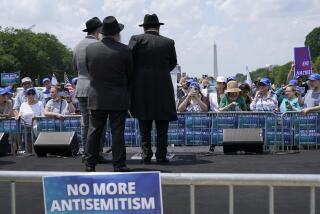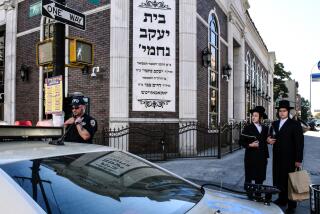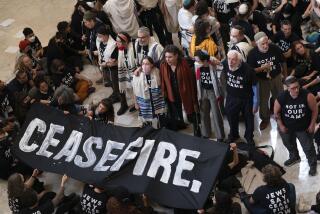U.S. Muslims’ views
- Share via
Almost six years after the 9/11 attacks gave Muslim Americans a new and sometimes painful visibility, they haven’t lost confidence in the American dream, according to a recent study. But they are markedly less trustful than their non-Islamic neighbors of the Bush administration’s intentions.
First the good news from a telephone survey of 1,050 Muslims conducted this year by the Pew Research Center: Muslims in America — 77% of whom are U.S. citizens — are “largely assimilated, happy with their lives and moderate with respect to many of the issues that have divided Muslims and Westerners around the world.” They reject Islamic extremism by larger margins than do European Muslims, and the study suggests why: Muslims here generally mirror the overall U.S. population in income and education. In France, Germany, Britain and Spain, Muslims are significantly poorer than the general population.
Like any study, this one has its puzzles and paradoxes. Asked if it were possible for most people to “get ahead with hard work,” 71% of respondents answered yes, compared to 64% of the public as a whole. That might seem to suggest skepticism about a prominent role for government in improving the fortunes of the poor. Actually, 73% of respondents in the survey said the federal government should do more to help the needy, compared to 63% of the overall population. Yet even here, the differences are a matter of degree.
That’s not the case, however, when it comes to the U.S.-led war on terror. Just 26% of respondents said they agree that it is “a sincere effort to reduce terrorism,” compared to 67% of the general public in a 2004 poll. (Non-Muslim Americans were not interviewed in this year’s survey.) Younger Muslims, the poll found, are more radical in their views. While 6% of those 30 or older believe that suicide bombings are “often” or “sometimes” justified, the figure for those under 30 is an ominous 15%.
The generations were closer in their views when asked whether life for Muslim Americans has become harder since 9/11. That proposition was accepted by 58% of respondents aged 18 to 29; the percentage for those aged 30 to 39 and 40 to 54 was 53%. That experience may offer an emotional explanation for one the most bizarre findings: Only 40% of respondents agreed with the proposition that the 9/11 attacks were carried out by Arabs, and 28% rejected that scenario. Almost a third — 32% — said they didn’t know who was responsible for 9/11 or declined to answer.
These responses suggest that President Bush was wise to declare after 9/11 that the United States is not at war with Islam, a message he has reinforced with symbolic gestures such as a White House celebration marking the end of the Ramadan fast. But they also show that, despite such assurances, the administration has a credibility problem with American Muslims that it needs to address. In doing so, the Pew report makes clear, it will be talking not to strangers but to Americans.
More to Read
A cure for the common opinion
Get thought-provoking perspectives with our weekly newsletter.
You may occasionally receive promotional content from the Los Angeles Times.









